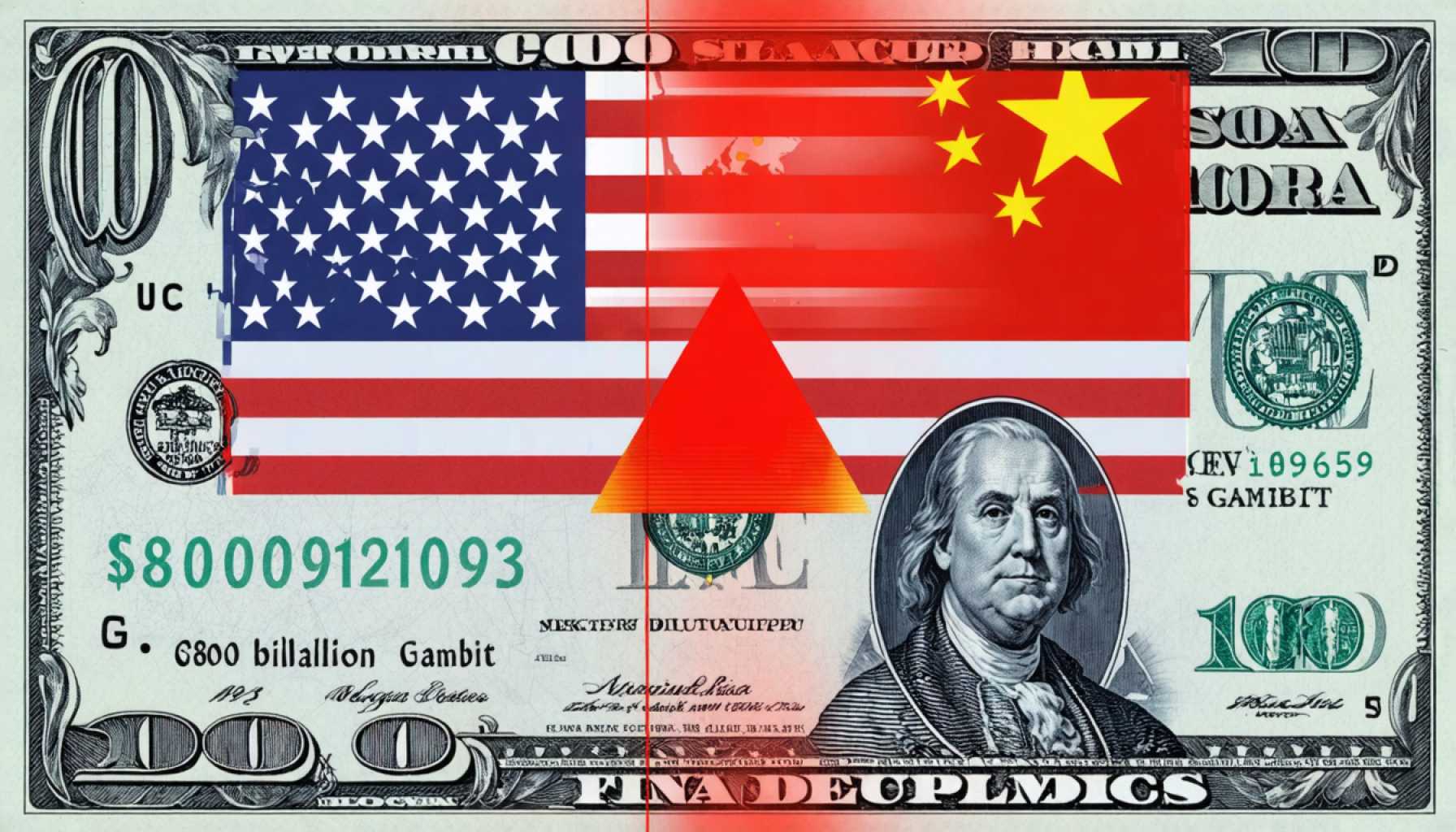- Geopolitical tensions between the U.S. and China threaten financial interdependence, with potential forced liquidation of over $800 billion in Chinese securities by American investors.
- Key assets include $250 billion in American-listed ADRs, $522 billion in Hong Kong shares, and onshore A shares.
- Goldman Sachs warns of a potential 9% drop in ADR valuations and a 4% decrease in the MSCI China Index due to compelled sales.
- China might retaliate by selling $1.3 trillion in U.S. bonds and $370 billion in shares.
- The Kraneshares CSI China Internet Fund faces risk, with significant U.S. ownership and potential passive outflows of $11 billion.
- The threat of financial decoupling is a pressing concern for portfolio managers, reflecting the volatility of global finance.
Amid mounting geopolitical tensions, the vast expanse of U.S.-China financial interdependence stands on shaky ground. Investment bank Goldman Sachs is sounding a cautionary gong: if tensions spiral into full-scale decoupling, American investors could be left grappling with an unprecedented forced offloading of over $800 billion in Chinese securities.
Picture this: American portfolios brimming with Chinese equities face the threat of mass liquidation. The numbers are staggering—$250 billion in American-listed ADRs, a hefty $522 billion in Hong Kong shares, and a portion of onshore A shares. The shifting winds have Treasury Secretary Scott Bessent, with all options squarely on the table, echoing the alarm once raised during the Trump era. The drumbeat of potential delistings that seemed like a distant echo now booms with urgency.
The ramifications of such financial decoupling could sweep across markets with swift and unforgiving momentum. Goldman Sachs projects a dramatic 9% slide in ADR valuations and a 4% slump in the MSCI China Index cascading from these compelled sales. U.S. stakeholders might liquidate A shares in swift order, but untangling Hong Kong’s holdings and ADRs might demand 119 and 97 days, respectively, dragging markets into a prolonged period of uncertainty.
Turn the mirror, and China’s own investments in the U.S. loom large. Holders of $1.7 trillion in U.S. treasures could retaliate fiercely—unloading vast swathes of $370 billion in shares and a monumental $1.3 trillion in bonds.
At the eye of this brewing storm, funds heavily vested in Chinese markets brace for impact. The Kraneshares CSI China Internet Fund, a major U.S.-listed ETF with a compelling 33% in ADRs, stares down a pivotal moment. Disturbingly, half of these couldn’t leverage a Hong Kong safety net. With a whopping 72% U.S. ownership, any whispers of delisting could ignite a frenzied sell-off. JPMorgan’s projections add another layer to the tension, anticipating $11 billion in passive outflows due to index omissions.
The compelling takeaway? The decoupling cliff is a construct no longer confined to theoretical discourse but a stark risk future occupying the desks of portfolio managers worldwide. As global finance becomes an arena replete with turbulence, it underscores a heart-pounding truth: the world of investment is teetering on a precipice, with portfolio managers intently assessing risks as the echoes of the past become roars of the present.
U.S.-China Financial Tensions: What Every Investor Needs to Know Now
Understanding the Depth of U.S.-China Financial Interdependence
Recent geopolitical tensions between the United States and China have brought their financial entanglements into sharp focus. With investment bank Goldman Sachs highlighting potential decoupling risks, the financial world is on high alert. Should these tensions heighten to a full-scale decoupling, U.S. investors could find themselves forced to divest over $800 billion in Chinese securities. Let’s delve into more facets of this issue to provide a clearer picture of the stakes and possible outcomes.
Market Forecasts & Industry Trends
1. Potential Impact on U.S. Portfolios: The liquidation of $250 billion in American-listed ADRs and $522 billion in Hong Kong shares could lead to substantial volatility. Goldman Sachs projects a potential 9% drop in ADR valuations and a 4% decline in the MSCI China Index.
2. Implications for U.S. and Chinese Investments: The decoupling could see American investments in Chinese assets diminish, while Chinese investments, including $1.7 trillion in U.S. treasures, might witness retaliatory actions. This includes unloading $370 billion in shares and $1.3 trillion in bonds, creating ripple effects across global markets.
3. ETF Vulnerabilities: Funds heavily invested in Chinese markets, like the Kraneshares CSI China Internet Fund, could face significant stress. With 33% in ADRs and 72% of ownership based in the U.S., these ETFs may experience heightened volatility and sell-offs.
Real-World Use Cases: How Investors Should React
1. Diversification: Investors may need to reassess their portfolios for greater diversification. Increasing exposure to markets outside of China can reduce potential risks associated with geopolitical tensions.
2. Monitoring Market Signals: Stay informed about policy changes and their potential impacts on global markets. Following indexes and utilizing resources like Goldman Sachs reports can offer insights into emerging trends.
3. Risk Assessment: Engagement with financial advisors to evaluate exposure to Chinese markets can help mitigate risks. Proactively adjusting positions in light of potential decouplings or delistings is advisable.
Pros & Cons Overview
– Pros:
– Increased awareness and risk assessment of geopolitical influences on global finances.
– Motivation for diversification and innovation within portfolio strategies.
– Cons:
– Potential for significant financial losses during forced asset sales.
– Prolonged market instability leading to investor anxiety.
Actionable Recommendations
– Stay Informed: Regularly consult trusted financial news sources and market analysis reports to remain updated on developments.
– Consider Emerging Markets: Look towards sectors and regions less affected by U.S.-China tensions for potential growth opportunities.
– Engage Financial Advisors: Utilize their expertise for crafting resilient and adaptive investment strategies in volatile markets.
As the future of U.S.-China financial relations hangs in the balance, investors must remain vigilant and responsive to changes. By exploring diversified avenues and staying informed, they can better position themselves against the uncertainties ahead. For further reading and financial advice, visit Goldman Sachs.
